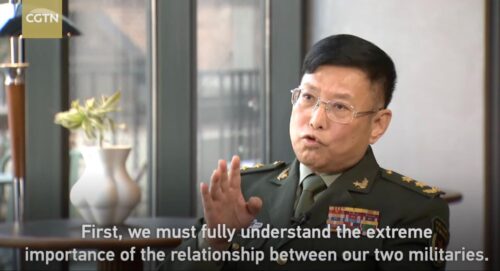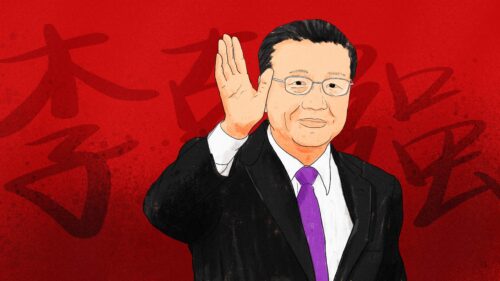Spying on China’s weather
...and The Age of Not Obvious | October 31, 2023
Dear reader,
Beijing is sending warm signals to Washington, D.C., again with an event today to honor the Flying Tigers, the American volunteer pilots who assisted China in its fight against Japan during World War II. This makes it look much more likely that Xí Jìnpíng 习近平 will attend the APEC summit in San Francisco in November.
Our Word of the Day is: Central Financial Work Conference (中央金融工作会议 zhōngyāng jīnróng gōngzuò huìyì), the new name of the National Financial Work Conference (全国金融工作会议 quánguó jīnróng gōngzuò huìyì).
Scroll down to the state media section of the News Briefing below for more on both of the above.
If you’re not already a subscriber, sign up for our Daily Dispatch, or our free Weekly.
 |
Jeremy Goldkorn
Editor-in-Chief
|
CURRENT AFFAIRS
China’s crackdown on data ensnares ‘foreign-related’ weather stations |
 “An illegal weather station sensor installed by an overseas enterprise.” Caption and image via China’s Ministry of National Defense. “An illegal weather station sensor installed by an overseas enterprise.” Caption and image via China’s Ministry of National Defense. |
China’s spy agency is cracking down on “foreign-related” weather stations, citing risks to the country’s national security.
Beijing has ramped up scrutiny on cross-border data flows over the past few years, as it looks to strengthen control over the vast troves of data generated by the world’s second-largest economy and second-most populous nation.
China in recent months has also passed wide-ranging legal amendments that have fueled concern over the risks to individuals and organizations operating in the country, particularly those in sensitive industries such as journalism, technology, research, and data monitoring.
Meanwhile, the MSS has encouraged everyday citizens in China to be on the lookout for potential espionage ever since it opened its WeChat account in July. While the Chinese government has long encouraged its people to report any spying activities through perks like cash incentives, the MSS’s first WeChat post called for a “whole of society mobilization” against espionage. Click here for all the details.
Nadya Yeh |
NEWS BRIEFING
| Here’s what else you need to know about China today:
China’s manufacturing activity unexpectedly contracted in October, data from the country’s National Bureau of Statistics showed today. The country’s official manufacturing purchasing managers’ index (PMI) recorded 49.5 this month, down from the 50.2 reading in September. (PMI readings above 50 indicate expansion, while those below that level signal contraction.) Former Premier Lǐ Kèqiáng 李克强 will be cremated on November 2, when flags will fly at half-mast across the country to mourn the late leader, Chinese state media reported. Li died from a heart attack at the age of 68 on October 27. But China’s powerful censors have warned mourners against “overly effusive comments” that may “offer exaggerated praise on the surface of what is actually an act of criticism” about his legacy, China Digital Times reported, given how the passing of any top Chinese Communist Party official can become a politically sensitive occasion. Antisemitism is on the rise in China amid the Israel-Hamas war, despite the Chinese government’s efforts to position itself as a diplomatic peace broker. Since the war broke out after the October 7 Hamas attacks, Chinese social media users have demonstrated more support for Palestine than for Israel. Meanwhile, searches and mentions involving the phrase “anti-Jew” have proliferated across the Chinese social media app WeChat, along with some comments that either threaten Jews outright or condemn those in support of them. (The China Project first reported on this phenomenon two weeks ago.) China paid tribute to a group of visiting veteran American volunteer pilots yesterday in Beijing to celebrate the friendship between the two countries during World War II, amid a flurry of recent diplomatic activity between U.S. and Chinese officials to relieve tensions. The First American Volunteer Group (AVG), better known as the “Flying Tigers,” were formed to help oppose the Japanese invasion of China, operating from 1941–1942. “The Chinese people would always remember the heroic deeds of the Flying Tigers and never forget the old friends,” Chinese Vice President Hán Zhèng 韩正 said at the meeting, per state broadcaster CCTV. “China and the United States should adhere to mutual respect, peaceful coexistence and win-win cooperation and make greater contribution[s] to world peace and development,” he added, reiterating statements made by Xí Jìnpíng 习近平 in a letter to the group’s veterans in September. As we noted then, “whenever Chinese officials mention the Flying Tigers, it’s a sure sign that they want to talk to their American counterparts,” so this looks like another signal that Xi will attend the APEC summit in San Francisco on November 15–17. Chinese electric vehicle (EV) giant BYD posted a record quarterly profit of 10.41 billion yuan ($1.42 billion) in the third quarter, an 82.2% increase from a year earlier. It’s the latest sign that BYD is closing in on rival Tesla, after it dethroned the Elon Musk-owned EV firm as the world’s largest electric vehicle maker in 2022. Meanwhile, Berkshire Hathaway, the investment company controlled by Warren Buffett, sold 820,500 Hong Kong-listed shares of BYD valued at HK$201.73 million ($25.78 million) on October 25, according to a stock exchange filing today. China’s state-backed chip investment fund injected 14.56 billion yuan ($1.99 billion) into a memory chip company called Changxin Xinqiao, as Beijing seeks to develop its chipmaking capabilities at home. China Integrated Circuit Industry Investment Fund, or more commonly known as the “Big Fund,” contributed 33.15% of the total registered capital of Hebei-based Changxin Xinqiao, according to an update dated October 26 to the company’s registration information on the National Enterprise Credit Information Publicity System (NECIPS), per Reuters. Chinese state media: Xinhua News Agency’s top story is titled “Central Financial Work Conference held in Beijing.” All members of the leading seven-man Politburo Standing Committee attended, and Xi Jinping and Premier Lǐ Qiáng 李强 both delivered “important speeches.” The conference used to be called the “National Financial Work Conference” (中央金融工作会议在北京举行) but this year was renamed “Central Financial Work Conference” (中央金融工作会议在北京举行), possibly another sign of the centralization of all important decision making under Xi, and the increasing politicization of China’s economic management. The first National Financial Work Conference was held in 1997. The People’s Daily today follows yesterday’s Xinhua top story with an article and photo of Xi Jinping mansplaining women’s rights to a group of women from the All-China Women’s Federation. Xi’s real intent is perhaps made clear in this section of the People’s Daily story:
Under Xi’s tenure, the ruling Politburo failed to include a single woman among its 24 members selected in 2022, breaking a tradition of two decades, while the current National People’s Congress has only 790 women out of 2,977 representatives.
|
SOCIETY AND CULTURE
The Age of Not Obvious: Going back to China in September 2023 |
 Illustration for The China Project by Derek Zheng Illustration for The China Project by Derek Zheng |
That was a phrase Kevin Xu heard uttered out loud, twice, during his trip to China last month. It wasn’t directed at him, a Chinese American fluent in Mandarin who can blend in like a chameleon, but rather his blond-haired, blue-eyed American fiancée. There is no dispute that China has become more wealthy and more modern over the last four decades, its current struggles notwithstanding. But however advanced, it is a walled-off inhospitable modernity, Xu writes, where one must play by its increasingly rigid rules. It’s a modernity that serves as a constant reminder of who is a foreigner and who is one of its own. What does this all mean? Click through to read Xu’s observations from high-speed trains, family gatherings, and lower-tier cities, or listen to him speak at our NEXTChina Conference in New York on November 2.
|
RUSSIA-UKRAINE WAR
Why does Zelenskyy accept China’s ‘neutrality’? |
 Illustration for The China Project by Derek Zheng Illustration for The China Project by Derek Zheng |
The Ukrainian president has become the face of Ukrainian resistance: Volodymyr Zelenskyy has made hundreds of public speeches in his country and abroad, playing the biggest role in his career — wartime president.
But he has never said a word against China, which has significantly intensified its cooperation with Moscow since the beginning of the full-scale invasion. Writing from Kyiv, Ukrainian Sinologist Vita Golod explains why. Golod will attend our NEXTChina Conference in New York on November 2.
|
More from the china project
|
FROM THE NEWSBASE
Below are links from our NewsBase to other noteworthy reports published in the last 24 hours from and about China.BUSINESS AND TECHNOLOGY:Economic gloom or boom Oil Gold Semiconductors AI Evergrande Alibaba SCIENCE, HEALTH, AND ENVIRONMENT:Pollution Space POLITICS AND FOREIGN AFFAIRS:The Communist Party, elite politics, and government Li Keqiang mourning U.S.-China military and commercial tiesU.S. lawmakers urge Yellen to speed up China outbound investment rules / Reuters Australia Finland Philippines Thailand Iran Europe SOCIETY AND CULTURE:A modern twist on funeral photography An out-of-this-world museum Art and censorship
|
</table





